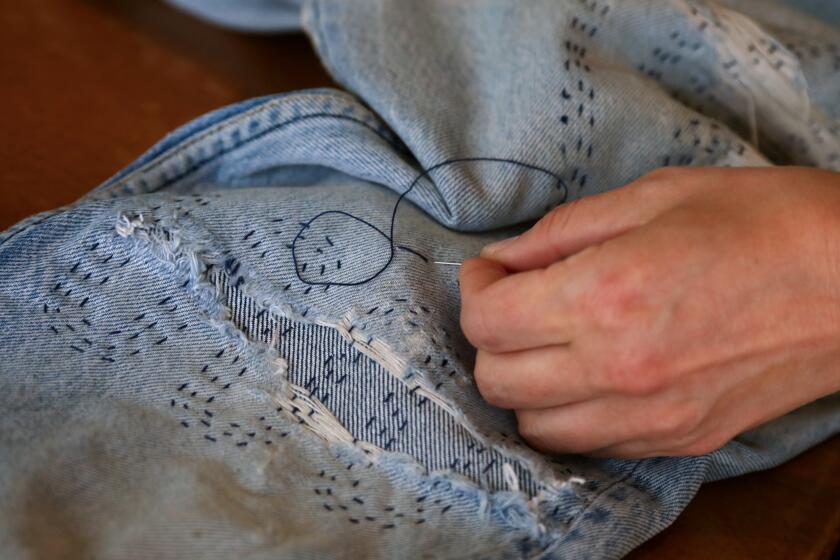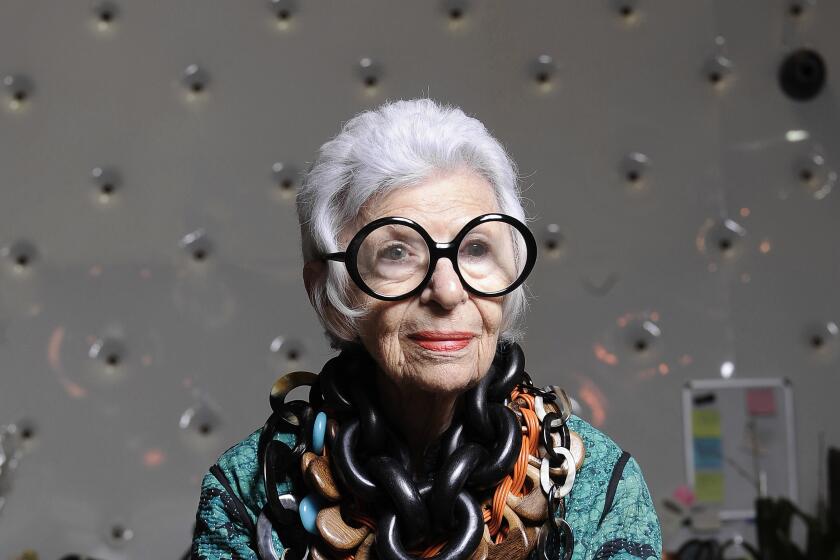New treatments to smooth and straighten hair
The stylists at Fred Segal Salon in Santa Monica were doing about two Brazilian Blowouts a day after the hair-smoothing product first came on the market six years ago. The $350 that Fred Segal Salon charged per treatment was a small price to pay for women with unruly curls, who raved about the Blowout’s miraculous power to tame frizz and straighten waves for months at a time.
“It was a great product. That’s why it was so popular,” said Fred Segal Salon owner Matthew Preece, who ran fans during the four-hour treatments and encouraged his stylists to wear masks to avoid breathing fumes.
But all that changed five months ago when his stylists voted to stop performing Brazilian Blowouts in light of relentlessly bad publicity over possible health risks. Now the salon offers Zerran RealLisse — a vegan hair-smoothing treatment made from plant extracts that lasts up to four months.
Zerran, which costs about $350 per treatment, is just one of several new products that have surfaced in salons in recent months, responding to the blowup over the Brazilian Blowout, a name-brand keratin-smoothing treatment.
The North Hollywood company that manufactures and distributes the Brazilian Blowout Acai Professional Smoothing Solution has been under fire from the U.S. government, individual states (including California and Oregon), cosmetics trade groups and independent hair stylists for more than a year. Lab tests conducted by government, industry and environmental groups have shown the product containing formaldehyde in levels higher than the legal limit — even in containers marked “formaldehyde free.” The chemical can irritate the eyes and nose; can cause allergic reactions in the eyes, lungs and skin; and is linked to cancer. For stylists, who can be exposed repeatedly, the dangers are of particular concern.
Brazilian Blowouts have been banned in Ireland, Canada, France and other countries, but they are still readily available in the U.S., although the Food and Drug Administration issued a warning letter in August threatening to seize all company products if formulary and labeling issues weren’t addressed. The Brazilian Blowout’s manufacturer has maintained that the product is safe and blames testing methods it says are faulty for the controversy.
Even so, consumers and salons alike are demanding alternatives, and they’re finding them in products with names that trumpet their environmentally friendly, chemical-free cred, including Farouk Systems’ Chi Enviro American Smoothing Treatment and Anevolve’s Control Zero American hair straightening.
“We’ve been working on the Chi Enviro treatment for more than three years,” said Farouk Shami, founder of Houston-based Farouk Systems. Shami says Chi Enviro is so safe that he ate the product during a television interview to underscore his point.
“If you can’t eat it, you cannot use it on people’s bodies or hair,” Shami said of the two-hour, $250 treatment that claims to eliminate up to 95% of frizz and curl and last as long as four months. “We are a company that believes in environmental issues and to save the lives of hairdressers, not to kill hairdressers with formaldehyde. Formaldehyde is for dead people, not for living people.”
Chi Enviro uses low-pH silk fibers to rearrange the amino acids in the hair and smooth curls, Shami said.
Another formaldehyde-free hair treatment, the Anevolve Control Zero Straightening System, has been on the market for nine months. It works with sodium sulfite, the same food-grade preservative used in many red wines. It operates by breaking down the disulfide bonds of the hair to soften the curl and reduce frizz. The treatment costs $150 to $450 depending on the salon and lasts four to five months, according to company spokeswoman Debra Kamino. Anevolve Control Zero grows out (similar to a mild hair-relaxing treatment) rather than wears off (like a Brazilian Blowout or Chi Enviro treatment).
Salon 119 in Palm Springs offers Anevolve Control Zero for $350. The salon also offers keratin-activated smoothing treatments and heat-activated Japanese Yuko hair straightening. It will soon introduce a new Brazilian Blowout alternative called Pravana, which is sulfate- and salt-free.
“It’s just a matter of trying them, experiencing them and redirecting our clients into a healthier, safer product,” said Salon 119 owner Michele Gerber. “We’re just waiting for products to be developed that look as good as the Brazilian.”
Doing so is a challenge. Many of the chemical- and formaldehyde-free products that have come on the market this year are for smoothers that reduce frizz — not hair straighteners that flatten curls. Formaldehyde-free straighteners often contain other chemicals, such as sodium hydroxide, ammonium thioglycolate or glutaraldehyde, which can also irritate the skin, eyes, nose and throat, according to the Environmental Working Group, a nonprofit environmental research organization based in Washington, D.C., that recently investigated chemically activated hair straighteners, including those that work with formaldehyde. Published in April, the EWG report did not include Zerran RealLisse, Farouk Systems’ Chi Enviro or Anevolve Control Zero.
“When the market has been dominated by a large number of companies that have been misbranding and misadvertising their products, it makes it more difficult for consumers to take companies at their word with their declarations of safety,” said David Andrews, senior scientist with the Environmental Working Group. “As a first rule of thumb, I’m most concerned about products that say they last longer than eight to 10 weeks and can be washed right after the treatment, like the Brazilian Blowout.”
What’s a consumer to do? Andrews advises asking salons whether previous clients have had adverse reactions to the product and if the treatment needs to be performed with ventilation or if contact with the skin should be avoided. And ask manufacturers how they have verified the safety of their products’ ingredients and whether they have fielded complaints.
“Until the FDA reviews the safety of ingredients used in cosmetics products,” Andrews said, “consumers and salon clients will not be fully assured of ingredients’ safety.”
The safest alternative, Andrews added, is a flat iron.
More to Read
Start your day right
Sign up for Essential California for news, features and recommendations from the L.A. Times and beyond in your inbox six days a week.
You may occasionally receive promotional content from the Los Angeles Times.






